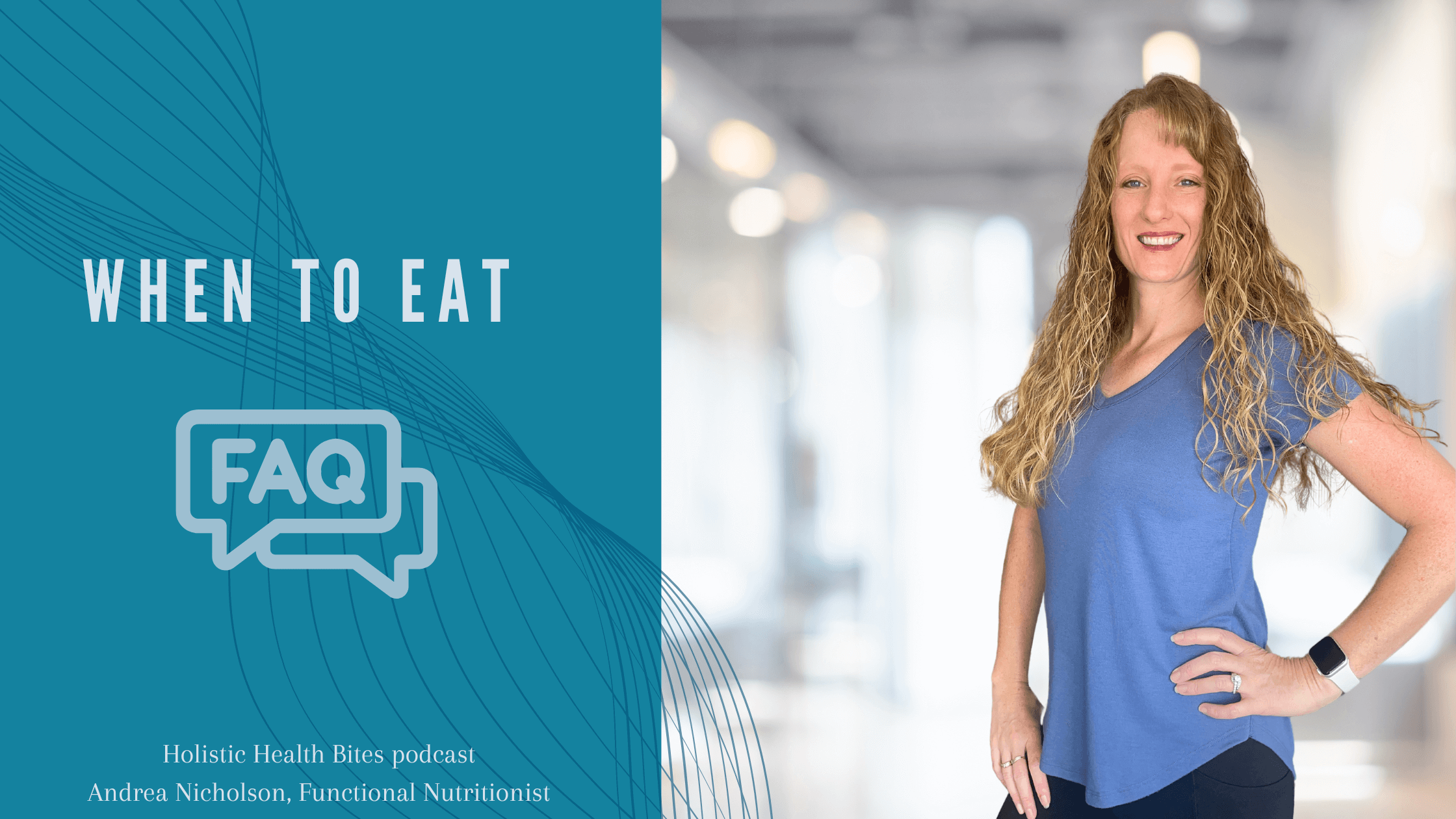
We’ve talked a lot on this podcast about different nutritional strategies that relate to WHAT to eat. It’s not secret that I am a big fan of various strategies that control for carbohydrates including ketogenic, ketovore, carnivore plans, as well as other lower carb approaches. When it comes to healthy eating, there are actually 3 levers we can pull…WHAT to eat, WHEN to eat, and HOW MUCH to eat.
Within the category of WHAT to eat falls the specific food choices, food combinations, and adjustments to the macronutrients. The WHAT of a quality low carb or ketogenic diet includes animal proteins, fatty fruits, and non-starchy vegetables primarily. The WHAT of a carnivore diet includes animal products only. The WHAT of a lower carbohydrate diet could also include limited amounts of fruit, starchy vegetables, legumes or sweeteners like honey.
Within the category of WHEN to eat falls the eating frequency and timing. This could include anything from the common advice of eating every 2-3 hours to fasting for 24 hours and only eating once per day. It also looks at the time of day you eat - 7am, noon, and 6pm? Or 11am and 7:30pm? In order to set this appropriately for YOU, we need to consider your other lifestyle factors, such as work schedule, family schedules, medication needs, and your personal natural rhythms.
Within the HOW MUCH to eat category falls portion size of overall food, but also the portions of the individual macros. Someone with type 2 diabetes has more serious carbohydrate intolerance than someone of ideal metabolic health.
Each of these levers are adjusted to the individual, their goals and various circumstances.
Today, I want to dive more into the WHEN to eat category and answer some common questions I get asked as a functional-medicine trained nutritionist.
Before diving into the questions, I want to point out that our food choices should support not only physical health but also mental and emotional well-being. It doesn’t matter how nutritionally sound or “perfect” a plan is…if you hate the food or dislike the process of following a plan, you’ll never stick with it. Be flexible and willing to try different things. But also know that it takes time for your body, tastes, and preferences to adjust. You may not love something day 1, but it may grow on you over a week or two. If something doesn’t work for you right now, come back and try again in a few months and see if your preferences have changed.
5 Common questions about WHEN to eat
Should I do intermittent fasting?
Intermittent fasting (IF) is following a specific eating schedule with a defined fasting window. One of the most common applications is time-restricted eating, where you restrict the number of hours a day when all food is consumed. For example, an 8-hour eating window between 10 am and 6 pm, leaving a 16-hour fasting period between 6pm and 10am the next day. Intermittent fasting has demonstrated several metabolic health benefits, such as weight loss, improved metabolic flexibility, and improved insulin sensitivity. However, there is no one “perfect” fasting schedule for everyone.
When helping my clients decide whether IF is right for them, I take into account the individual: are they on medications, do they have body fat to lose, what is their current diet and eating schedule, are they active, etc. I don’t recommend fasting to anyone who is underweight or has minimal body fat percentages, susceptible to disordered eating behavior, elderly, trying to conceive, currently pregnant or breastfeeding. Women can have different responses to fasting than men due to hormonal fluctuations and may create disrupted estrogen, cortisol, and thyroid hormones, increased hunger, inflammation, and fatigue. Generally, these are all signs of fasting too long or too much, undereating nutrients when eating, or other lifestyle factors.
Is late night eating a problem?
I generally recommend to stop eating 2-3 hours before bed whenever possible for quality sleep and optimizing metabolic health. Eating too close to bedtime can disrupt blood sugar balance, hunger hormones, and fat metabolism. It can also lead to acid reflux and difficulty digesting the meal. Digestion increases body temperature as well which can prevent deeper levels of sleep. If you must eat late, aim for having something light such as plain yogurt or cottage cheese with berries or veggie sticks and guacamole and a small portion of meat. This will provide quality protein and healthy fat to keep you satiated overnight. We are naturally more insulin resistant at night, so limiting carbs and refined sugars before bed is best.
But what about breakfast? Isn’t it the most important meal?
This is something we’ve all been told. I actually don’t disagree with it, but we need to reframe what it means. Breakfast is simply the first food you break your overnight fast with. It is vital that you do this properly for optimal metabolic health, brain function and body composition. But that doesn’t mean you have to eat first thing in the morning. You can absolutely break your fast at 11am, 2pm, or even at dinner time. What time you break your fast is variable based on YOU when considering the timing and type of exercise, your work schedule, any medications or supplements you take, your family dynamics, your appetite, etc. This is another category that will change over time as your life and body change. Today, you may find yourself being hungry when you first get up. That could be because you’ve eaten breakfast first thing in the morning for decades so you have the HABIT of hunger in the morning. It could also be that you are someone who does better eating your meals early in the day. Or it may change over time with a change in food choices and intentionally adjusting your eating schedule. Some studies show that there are bigger metabolic benefits to eating our food earlier in the day and starting the fast earlier…but many people find that to be difficult with family and social dynamics that tend to occur more in the evenings. In the end, my recommendation is to be flexible. If you’re truly physically hungry, eat. If you’re not, don’t. That will likely vary day to day. That’s Ok. As you adjust to taking in quality proteins, healthy fats, and the appropriate carbohydrates for you, you’ll find that your appetite also changes.
Should I eat small meals every few hours or two larger meals?
In general, I recommend eating less often. There are a few caveats, however.
First, you must be able to consume adequate amounts of overall food in those few meals. If you find that you’re chronically undereating, this won’t serve you well in the long run. Taking in adequate nutrients is key to ideal metabolic health, specifically when it comes to protein and healthy fats.
Second, if you’re on medications that must be taken at specific times and with food, you need to follow those recommendations. Depending on the medication and timing, you may be able to have a small bit of protein and/or fat and not have a full meal.
Third, if you struggle to digest larger meals, you may need to adjust the composition of your meals and/or address gut health prior to consuming fewer, but larger meals. This often is also true for the elderly simply due to changes in digestive capacity with age.
Fourth, if you’ve had any kind of gastric bypass or medical procedure that limits the amount of food you can consume at one time, eating larger meals would not be recommended.
On the other hand, consuming fewer, but larger meals has been associated with a higher thermic effect of food—the increase in your metabolic rate after you eat—compared to small, frequent meals. Eating less often also gives you fewer opportunities to overconsume calories and can help to calm the ‘food noise’ always thinking about meal prep, snacks, and food. And lastly, eating less often can reduce overall insulin needs. This, of course, varies greatly by the food choices you make. Eating two meals a day filled with pasta or bread will cause a very different insulin response than steak or salad with no sugar or refined carbohydrates added.
The easiest way to look at it is to eat when you’re truly hungry and don’t when you aren’t.
What about meal timing around exercise?
As with many other areas of nutrition, it depends. Research is conflicted here. Some research has shown that fasted exercise results in more fat burning, yet eating carbs before endurance training (such as a marathon or long-distance cycling) can improve performance, and yet other research and many personal anecdotes show that when a person is ‘fat-adapted’ through quality low carbohydrate nutrition strategies, endurance and strength are maintained or even enhanced.
As with fasting, recommendations differ for individuals. For those with stress or cortisol imbalances, it may be beneficial to ingest some carbohydrates and about 15 grams of protein before training to counteract the stress hormones that can be released during a fasted workout. Some also find that consuming quality protein, fats and carbs before a workout can help with recovery after an intense workout.
Most of my clients are doing light to moderate-intensity workouts under an hour, so I advise them to listen to their bodies. Pay attention to overall energy levels throughout the workout and the entire day. Look for any changes in digestion, body pain, swelling, mood, strength and endurance. You may also find differences in the time of day and/or the type of workout you do.
Nutrition in the research
Looking into the research on various nutrition strategies can be frustrating and not very helpful. In many cases you can find just as many supportive studies for a given topic as you find studies that show harm or no benefit. This can happen for a variety of reasons - who funded the studies, how long were the studies, how many people were involved, were they healthy or have a particular diagnosis, and what other confounding variables did they include or not consider? Sadly, most of what is reported is based on surveys of various populations. These are inherently inaccurate as people don’t provide honest answers either due to failure to recall correctly or even intentional deception. It is exceedingly difficult to create a study in human beings where you can control all but one variable. People are free living - you can’t fully control every bite they take, their exact activity level (even fidgeting burns calories), how well they digest and absorb nutrients, what underlying imbalances or genetic predispositions they may have, what toxins or chemicals they’re exposed to, what other hidden diagnoses they have, etc. This is why each persons’ plan needs to be customized to the individual. Be flexible. Be willing to try new things and stick with it for a bit to see if your body adapts. Don’t follow dogma. To streamline this process, find a professional who can help you find the best path to get you to your goals.
Conclusion
By being intentional about WHAT, WHEN, and HOW MUCH you eat, you can dramatically improve your metabolic health without unnecessary medications or procedures.





















0 Comments